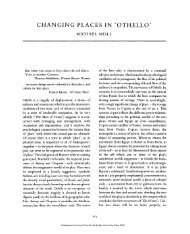the individualization of shakespeare's characters through imagery
the individualization of shakespeare's characters through imagery
the individualization of shakespeare's characters through imagery
Create successful ePaper yourself
Turn your PDF publications into a flip-book with our unique Google optimized e-Paper software.
INDIVIDUALIZATION OF SHAKESPEARE'S CHARACTERS<br />
We shall not touch on <strong>the</strong> scattered, incidental images in O<strong>the</strong>llo's speech which do not<br />
constitute integral groups. For instance, early in <strong>the</strong> play we meet a metaphor very typical <strong>of</strong><br />
Shakespeare in general, a metaphor <strong>of</strong> <strong>the</strong> <strong>the</strong>atre. "Were it my cue to fight, I should have known<br />
it without a prompter" (i, ii, 82). Or, to take ano<strong>the</strong>r example, <strong>the</strong>re is an image from Biblical<br />
legend. O<strong>the</strong>llo says that Emilia has an <strong>of</strong>fice opposite to that <strong>of</strong> Saint Peter; i.e. that she keeps<br />
<strong>the</strong> gates <strong>of</strong> hell (iv, ii, 90). All <strong>the</strong>se scattered <strong>the</strong>mes are not <strong>of</strong> importance to us.<br />
Thus we find a definite order in O<strong>the</strong>llo's world <strong>of</strong> images. The l<strong>of</strong>ty-poetic dominant is overpowered<br />
by <strong>the</strong> low <strong>the</strong>me stemming from Iago, only to triumph again at <strong>the</strong> last. The point<br />
at which <strong>the</strong> second <strong>the</strong>me makes its invasion is <strong>the</strong> image: "Chaos is come again." It is our<br />
opinion that this image has an objective ra<strong>the</strong>r than a subjective meaning, i.e. that chaos has come<br />
again in <strong>the</strong> universe, that <strong>the</strong> cosmos, <strong>the</strong> universe, has been upset; in o<strong>the</strong>r words, that <strong>the</strong><br />
world has changed in O<strong>the</strong>llo's eyes. Were we to take this image as subjective, i.e. as meaning<br />
that chaos had returned to O<strong>the</strong>llo's soul, we should have to assume that chaos had already been<br />
resident <strong>the</strong>re at some former time, an assumption for which <strong>the</strong>re are no grounds in <strong>the</strong> text.<br />
O<strong>the</strong>llo's story <strong>of</strong> his life (his monologue in <strong>the</strong> Senate) confirms that <strong>the</strong> l<strong>of</strong>ty-poetic <strong>the</strong>me,<br />
connected with <strong>the</strong> cosmos, is 'native' to O<strong>the</strong>llo, that he is a highly harmonic man and that,<br />
consequently, <strong>the</strong> low <strong>the</strong>me, connected with chaos, comes wholly from Iago.<br />
IAGO<br />
The low images prove predominant in Iago's role. The prevailing images are <strong>of</strong> beasts,<br />
represented as embodiments <strong>of</strong> foolishness, lechery and all kinds <strong>of</strong> loathsome vices. Iago sees<br />
<strong>the</strong> surrounding world as a stable or malodorous menagerie. A faithful servant is like an ass<br />
(1, i, 46). O<strong>the</strong>llo is trustful and can be led by <strong>the</strong> nose like an ass (1, iii, 407). Iago says that O<strong>the</strong>llo<br />
will yet reward him for making him an ass (n, i, 321). He does not want to "wear my heart upon<br />
my sleeve for daws to peck at" (1, i, 64). "Plague him [O<strong>the</strong>llo] with flies", i.e. with petty<br />
annoyances, Iago counsels Roderigo (1, i, 71). O<strong>the</strong>llo is "an old black ram" tupping a "white<br />
ewe" (1, i, 88). The carousing warriors <strong>of</strong> Cyprus are a "flock <strong>of</strong> drunkards" (n, iii, 62). O<strong>the</strong>llo<br />
is "a Barbary horse", Brabantio's grandchildren will neigh, and Brabantio will have coursers<br />
and gennets for relatives (1, i, 112 £). When in each o<strong>the</strong>r's arms, O<strong>the</strong>llo and Desdemona make<br />
"<strong>the</strong> beast with two backs" (1, i, 117). Iago calls Desdemona a prostitute, choosing <strong>the</strong> jargon<br />
word 'guinea-hen' as a synonym; he dissuades Roderigo from drowning himself for love <strong>of</strong> a<br />
'guinea-hen' (1, iii, 318). He says that sooner than do that he would "change my humanity with<br />
a baboon" (1, iii, 319). "Drown cats and blind puppies", he tells Roderigo (1, iii, 341). Women<br />
in <strong>the</strong>ir kitchens are 'wild-cats' (n, i, no). In Iago's words one man differs from ano<strong>the</strong>r as "<strong>the</strong><br />
cod's head" from "<strong>the</strong> salmon's tail" (n, i, 155). "With as little a web as this will I ensnare as<br />
great a fly as Cassio" (11, i, 169) says Iago, comparing himself to a spider. He compares Roderigo<br />
to a hunting dog which he sets upon Cassio (n, i, 316). When Cassio has drunk some wine, he will<br />
become as quarrelsome as Desdemona's dog (n, iii, 54). He assures Cassio that O<strong>the</strong>llo has<br />
punished him for <strong>the</strong> sake <strong>of</strong> policy, in order to put fear into <strong>the</strong> hearts <strong>of</strong> <strong>the</strong> people <strong>of</strong> Cyprus,<br />
"as one would beat his <strong>of</strong>fenceless dog to affright an imperious lion" (n, iii, 278). Cassio and<br />
Desdemona are, in his words, as lecherous as goats, monkeys and wolves (m, iii, 404). He<br />
compares a married man to a yoked ox (iv, i, 67). This 'menagerie' <strong>of</strong> Iago's is reflected, as we<br />
87<br />
Shakespeare Survey Online © Cambridge University Press, 2007



